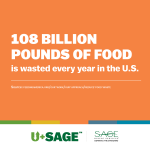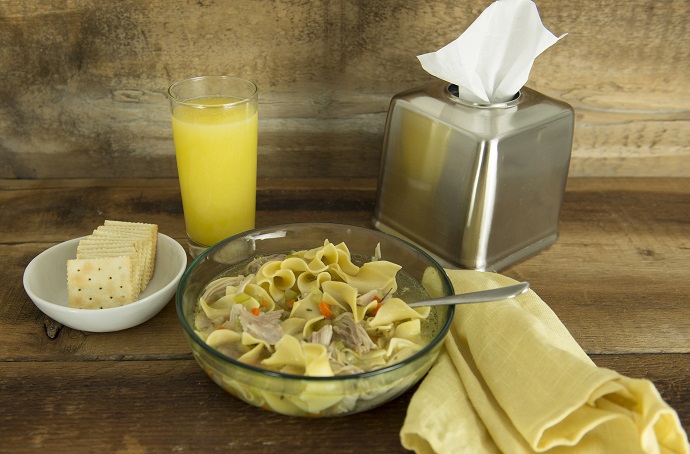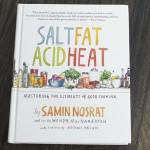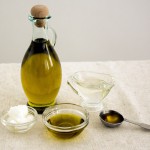We’ve all been there. You’re coming down with something fast, and even though you’ve heard all the old wives’ tales—start the BRAT Diet; starve a fever, feed a cold; make Grandma Rosa’s chicken noodle soup; pick up some Emergen-C®; chug a gallon of orange juice—you’re still at a loss for the right remedy.
There’s so much conflicting advice because there are so few scientific studies dedicated to determining what’s true. Some folk remedies have been investigated, but conclusions have been drawn from relatively sparse evidence. It seems that chicken soup really does help you get over a cold more quickly, and honey works just as well to soothe a cough as an over-the-counter cough suppressant. But by and large, we know a lot about specific vitamins and minerals, and very little about how whole foods work to keep you well or help you get better.
As we wait for larger-scale studies to investigate the role of whole foods in lessening the duration and severity of various illnesses, here’s some practical advice.
An ounce of prevention is forever worth a pound of cure. Don’t wait until you’re sick and run-down to do what you know you should. Exercise daily. Eat a variety of fruits, vegetables, whole grains, healthy fats, and lean proteins. If you choose to enjoy alcohol, sweets, and other sources of added sugar and empty carbohydrates, do so in moderation. Stay hydrated. Boost your immune system with zinc (in meat, poultry, and mushrooms), vitamin C (in fruits and veggies like kiwi and bell peppers), omega-3 fatty acids (in salmon and nuts), and probiotics (in cultured milk products like yogurt and kefir). And stock up on vitamin A (in orange produce like sweet potatoes, carrots, and pumpkin) and vitamin D (in eggs and fortified dairy products), which have been shown to reduce the frequency of upper respiratory infections.
When you do get sick, the above basics still apply. Eat whole foods to give your body the energy and nutrients it needs to fight off pathogens and heal damaged tissues. Stay hydrated with whatever liquids you can keep down—if you can’t stomach plain water, try fruit juice, tea, or soup.
If you’re experiencing specific symptoms, here are some research-backed tips for easing your discomfort and accelerating your recovery.
Cold Symptoms
- Eat chicken soup! While evidence is inconclusive, separate studies have shown that chicken-and-vegetable soup reduces upper respiratory cold symptoms, loosens nasal mucus better than hot water alone, and improves the function of the nasal cilia that keep pathogens out of your airways.
- Incorporate zinc and vitamin A into your diet to shorten the duration of your cold. Vitamin C will only shorten the duration of your cold by a day or so, and that’s only if you take it regularly—not just when you feel a cold coming on.
Congestion
- Drink herbal tea or hot water to loosen phlegm.
- Enjoy spicy foods to clear your sinuses.
Cough and Sore Throat
- Honey is effective for suppressing a cough. Add a spoonful or two to your cup of tea to soothe your throat.
Diarrhea and Vomiting
- Don’t throw the BRAT (Bananas, Rice, Applesauce, and Toast) diet out just yet. Eating bananas and rice has been shown to reduce diarrhea, vomiting, and fluid loss.
- Start by introducing crackers, dry cereal, or plain white bread. Introduce other foods as you tolerate them—small, frequent snacks are best.
- Hydrate with a sports drink to quickly and conveniently replenish not only fluids and carbohydrates, but also electrolytes. Beverages like Pedialyte® are also great options.
- However, following the BRAT diet or any restrictive eating pattern when you’re sick can lead to underconsumption of key nutrients like protein, fat, vitamins, and minerals. Try to maintain a balanced diet if possible.
Flu Symptoms
- Make sure that you’re eating enough! The less energy you have, the slower the killer cells (pathogen-destroying white blood cells) in your body will react, and the longer the flu virus will have to accumulate and reproduce.
- Small, frequent meals and snacks are a great option to maintain your energy intake.
Nausea and Stomach Upset
- Drink ginger or peppermint tea to soothe nausea.
- Lemons and other citrus fruits can also reduce nausea. Sniffing them may help, even if you can’t tolerate eating anything.
- Foods high in fat may result in continued nausea, as fat takes longer to digest. Stick with high-protein foods and avoid large meals.
- Smoothies can be a great option if solid food exacerbates your symptoms.
Sources
https://well.blogs.nytimes.com/2007/10/12/the-science-of-chicken-soup/
https://www.practicalgastro.com/pdf/June07/June07DuroArticle.pdf
http://msutoday.msu.edu/news/2010/countering-the-flu-with-calories/
https://www.health.harvard.edu/staying-healthy/how-to-boost-your-immune-system
http://www.womansday.com/health-fitness/nutrition/a4488/fight-the-flu-food-102133/
https://www.rd.com/health/wellness/what-to-eat-when-sick/
http://www.umm.edu/health/medical/altmed/condition/pharyngitis









